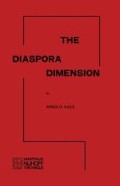Abstract
Symbiosis generally occurs when a minority, whose foreign origin is not forgotten, takes over the culture and way of life of its surroundings and becomes more and more like the world in which it lives. In Germany, the attempt on the part of Jews to realize a symbiosis with their environment, produced tremendous tensions within the community. That tension was reflected in the religious schisms which are still a part of Judaism today.
“How loathsomely degrading, how offensive insane, and low are my surroundings which I cannot avoid. One single defilement, a mere contact, sullies me and disturbs my mobility. I imagine that just as I was being thrust into this world a supernatural being plunged a dagger into my heart with these words: ‘Now, have feeling, see the world as only a Jew can see it, be great and noble … But with one reservation: be a Jewess!’ ” Rahel Levin circa 1817
Access this chapter
Tax calculation will be finalised at checkout
Purchases are for personal use only
Preview
Unable to display preview. Download preview PDF.
Notes
Adolph Leschnitzer, The Magical Background of Modern Anti-Semitism (New York, 1969), p. 105.
Karl Schleunes, The Twisted Road to Auschwitz (Chicago, 1970), p. 7.
Marvin Lowenthal, The Jews of Germany (Philadelphia, 1936), p. 334.
Quoted in Erick Kaller, “The Jews and the Germans”, in Studies of the Leo Baeck Institute (New York, 1967), p. 33.
Leo Trepp, Conservative Judaism III, November 1946, No. 1, p. 3.
Quoted in Emil Fackenheim, “Herman Cohen: After Fifty Years”, Leo Baeck Memorial Lecture 12 (New York, 1969 ), p. 9.
Eva Jospe, Reason and Hope: Selections From the Jewish Writings of Hermann Cohen (New York, 1971) pp. 34, 35.
Quoted in V.P. Segre, Israel A Society in Transition (Toronto, 1971), p. 34.
Jackor-Fleischmann, “Franz-Rosenzweig as a Critic of Zionism”, Conservative Judaism XXII, No. 1, Fall 1967, pp. 58, 62.
Jacob Marcus, The Jew in the Medieval World (New York, 1960), p. 165.
Friederich Heer, God’s First Love (London, 1970), p. 128.
Quoted in A. Bein, “Anti-Semitism and the Jewish Question”, Yad Washem Studies III, (Jerusalem, 1959), p. 10.
Jaroslav Pelikan, (editor) Luther’s Works (St. Louis, 1958), IV, 351; VIII, 142; VII, 216; VIII, 195.
Salo W. Baron, A Social and Religious History of the Jews (New York, 1969 ), XIII, pp. 217–218.
Marvin Lowenthal, The Jews of Germany (Philadelphia, 1936), p. 162.
Ben Zion Dinur, Israel and the Diaspora (Philadelphia, 1969), p. 88.
Werner Keller, Diaspora The Post-Biblical History of the Jews (New York, 1968), p. 344.
Leon Poliakov, “Anti-Semitism and Christian Teaching”, Midstream XII, No. 3, March 1966, p. 16.
Solomon Liptzin, Germany’s Stepchildren (Philadelphia, 1948), pp. 60, 63.
Emil L. Fackenheim, God’s Presence in History (New York, 1970), p. 56.
P.G.J. Pulzer, The Rise of Political Anti-Semitism in Germany and Austria (London, 1964), p. 50.
Ronald Sanders, “My Tragic Enterprise: Reflections on Theodor Herzl”, Midstream XII, No. 3, March 1966, p. 31.
Michael Meyer, “Great Debate on Antisemitism”, Publications of the Leo Baeck Institute (London, 1966). pp. 145–147.
Eleonore Sterling, “Jewish Reaction to Jew-Hatred”, Publications of the Leo Baeck Institute (London, 1958), pp. 105–110.
A. Menes, “The Conversion Movement in Prussia During the First Half of the 19th Century”, Yivo Annual of Jewish Social Science VI (New York, 1951 ), p. 188.
Rights and permissions
Copyright information
© 1973 Martinus Nijhoff, The Hague, Netherlands
About this chapter
Cite this chapter
Ages, A. (1973). Anti-Semitism, Nationalism, Self-Hate The Failure of Symbiosis. In: The Diaspora Dimension. Springer, Dordrecht. https://doi.org/10.1007/978-94-010-2456-3_10
Download citation
DOI: https://doi.org/10.1007/978-94-010-2456-3_10
Publisher Name: Springer, Dordrecht
Print ISBN: 978-94-010-2458-7
Online ISBN: 978-94-010-2456-3
eBook Packages: Springer Book Archive

